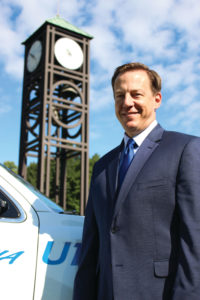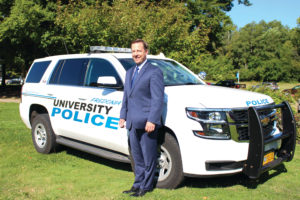SOPHIE WOJCIECHOWSKI
Special to The Leader

Brent Isaacson, former FBI Special Agent and U.S. Navy nuclear engineer, became the University Police Chief just a short three months ago. He replaced Ann Burns after she retired, having been the UP Chief for 37 years.
Chief Isaacson was born and raised in Jamestown and went to the University of Rochester on a Navy ROTC scholarship. He was a Navy officer right out of college. He was a nuclear engineer for six years until he left and worked at Westinghouse in Pittsburgh.
For a total of nine years, Isaacson was an engineer. So what made him want to go into policing?
His brother, a Jamestown police officer, took him for a ride-along.
“Speeding through city streets, lights and sirens … that was a lot of fun,” Isaacson said, smiling at the memory.
In 1996, Isaacson was hired by the FBI after applying “almost on a whim.” He stayed with the FBI for 23 years as a criminal investigator.
A lot of this involved having to investigate a lot of difficult crimes, such as murders, multimillion-dollar frauds and even child sexual exploitation.
He was also involved in “profilers,” which he explained as “Criminal Minds”-like stuff. To be good at this, he had to know the psychology of criminals, why they do the things they do. And after the Sandy Hook shooting, the White House and Congress tasked the FBI with understanding the psychology of school shooters.
And so Isaacson went back to school and got a masters in psychology, with his studies focused on violence prevention.
For most of his FBI career, he was assigned to the Jamestown office. At this time, he met Jamestown Police Detective Neil Bogosian, who was a new patrolman when they first crossed paths. Now Bogosian is a member of the department’s Drug Enforcement Unit and is assigned to a DEA task force in Buffalo.
In 1999, Isaacson “came out and assisted on an officer involved shooting in September,” Bogosian said. “I had about two years on the job at the time. I was scared. We all were. An armed cop killer was on the loose and would likely try to kill one of us if we encountered him.”
The officer that was shot survived and is still a friend of Bogosian’s.
Isaacson and Bogosian have encountered each other professionally many times after, and Bogosian has “a great deal of respect for him” and he considers him a friend.
Isaacson’s work in the FBI also brought him closer to schools, where he worked to find people who might be moving toward a “pathway of violence,” and then get them the help they need to go back to a healthy path rather than a violent one.
With the experience in working with K-12 schools and universities to make those campuses safer, he hopes to make Fredonia’s campus the safest in the country. Doing this involves “building a culture where we all take care of each other,” he said.
In order to do that, especially with his officers, it is a lot of “enhancing our community policing efforts.” He even has pictures of one of his officers playing ping-pong with a bunch of students in one of the resident halls.
“Those kinds of interactions … it’s a positive relationship, or a positive interaction. Students aren’t getting tickets from cops, they’re having fun with cops,” he said.

Derek Sunderland, a resident assistant in Hemingway Hall, did notice that there was an increase in police activity on campus. He said they are “more involved with residents and in residence halls.”
In addition to having the officers mingle more with students, University Police is coming out with a new app called Rave. This app is really “a blue light phone in your pocket.” Just push a button on your phone and it sends out an alert with your location attached to it that says you need police help, whether it is a medical emergency, a fire emergency, or any emergency that requires police help.
This app works both on and off campus, but if you are off campus there will be a button that is a “9-1-1 button,” so police from either Fredonia or Dunkirk will come rather than University Police.
It is expected to come out within the next few weeks.
Going to work as a university police chief right after being in the FBI is quite a change, but one that Isaacson enjoys. While in the FBI, he provided justice for crimes that were already done, whereas he is now in a position to prevent bad things from happening.
Isaacson also said that he is impressed by the quality of the officers here. After being here for three months, he has come to know all of them. They are “very caring, very motivated, they’re all very well-trained,” he said.
As he said, of being at Fredonia, “this is the right mission for me, at the right time in my life.”
